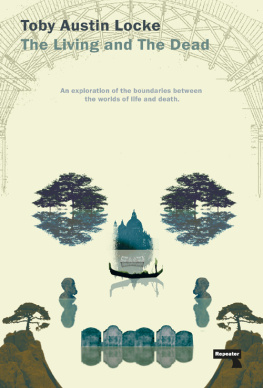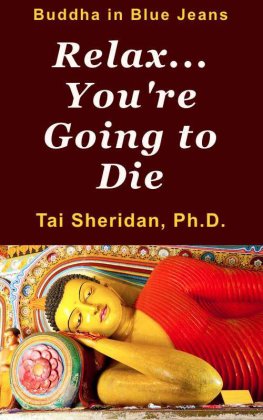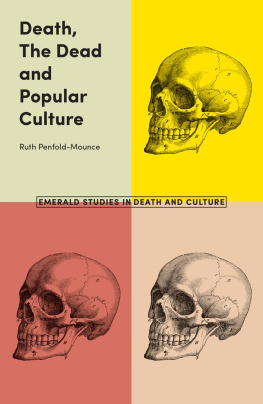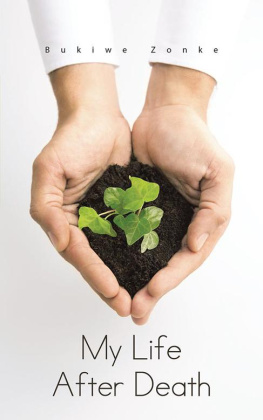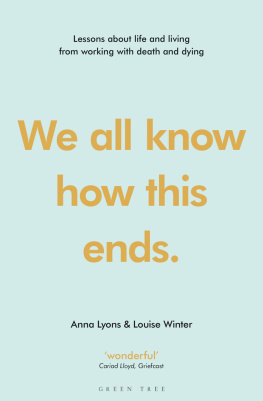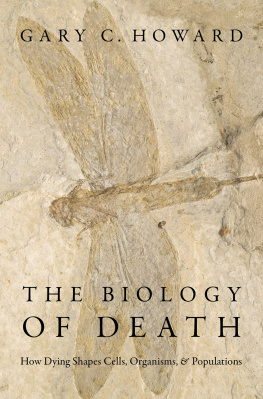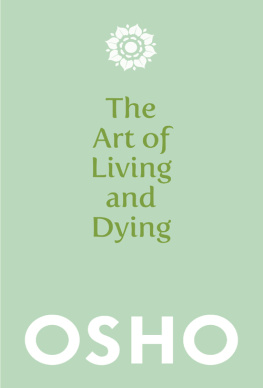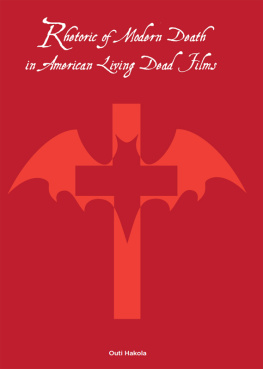The Living and the Dead
TOBY AUSTIN LOCKE
The Living
and the Dead
An Essay on the
Tendential Continuities
of Life and Death
Published by Repeater Books
An imprint of Watkins Media
Ltd 19-21 Cecil Court
London
WC2N 4EZ
UK
www.repeaterbooks.com
A Repeater Books paperback original 2016
1
Distributed in the United States by Random House, Inc., New York.
Copyright Toby Austin Locke 2016
Toby Austin Locke asserts the moral right to be identified
as the author of this work.
ISBN: 978-1-910924-32-7
Ebook ISBN: 978-1-910924-33-4
Cover design: Johnny Bull
Typography and typesetting: Jan Middendorp
Typefaces: Chaparral Pro, Absara Sans, Alegreya Italic
Printed and bound in Great Britain
All rights reserved. No part of this publication may be reproduced, stored in a retrieval system, or transmitted, in any form or by any means, electronic, mechanical, photocopying, recording or otherwise, without the prior permission of the publishers.
This book is sold subject to the condition that it shall not, by way of trade or otherwise, be lent, re-sold, hired out or otherwise circulated without the publishers prior consent in any form of binding or cover other than that in which it is published and without a similar condition. ng this condition being imposed on the subsequent purchaser.
What heaven, what pleasure does your life offer which outweighs deaths delights? Doesnt all that inspires us bear the color of the Night? It bears you mother-like, and you all your magnificence to her.
Novalis
But if death calls, although the noise of the call fills the night, the call is a kind of profound silence. The response itself is stripped of every possible meaning. This is gripping: the greatest voluptuousness that the heart endures, a morose, crushing voluptuousness, a boundless heaviness.
Georges Bataille
Contents
A Preamble
by Way of
Impotent
Apology
My impotence to expound the question of death must be made clear from the offset. To claim to be able to tell you what death is, how it functions, the manner in which it reveals itself to us, would be fundamentally dishonest. There can be no normative definition or understanding of death. But this does not make it a topic unworthy of discussion. Death stands before us as unknowable, but at the same time as inevitable. That life is run through with death and death with life is one of those rare safe things we can say. But this intertwining simultaneously reveals the most profound feeling as regards death; namely, that the very conditions of our becoming are entangled with and inextricably associated to unknowable conditions, conditions that our myopia, our short-sightedness and tunnel vision, forever leave floating before us just beyond the reach of clear perception.
It is death that installs nonknowledge at the base of knowledge and misosophy at the base of philosophy. As that of which all of the living are aware, and fleeing towards, and yet remains unknowable, death reminds us not only of our own finitude and mortality, but also of our impotence, myopia and powerlessness, our foolishness and ignorance. For this reason, among others, to speak of death is in one sense the greatest and cruellest act of tragicomedy for it brings into the space of knowledge and discourse that which is unknowable and which always exceeds knowledge. The theorist or philosopher confronting death confronts their own child-like foolishness, their own inability to think. And what is more, it denies the very foundations of transcendent metaphysics that system of knowledge that for so long assured us of our own divinity, eternity and superiority.
Georges Bataille puts it as follows:
Death teaches nothing, since we lose the benefit of the instruction that it might offer us by dying. Its true, we think about the death of the other. We reconcile the impression that the death of the other gives us with ourselves. We often imagine ourselves in the position of those who we see dying, but we can only justifiably do this on the condition of living. Reflection on death is much more seriously derisive than living, it is always scattering our attention, and we speak in vain about exerting ourselves, when death is at stake.
Of course, talking about death is the most profound practical joke.
Alongside this cautionary word against my own impotence in approaching the question of death I must also offer the following caution. Throughout the pages that follow I shall draw upon a range of writers, ideas and perspectives, but I will do so in a manner that makes no claim to be representing either a universal statement of what death may mean, or indeed what any of the authors and thinkers themselves may have meant. This is perhaps unnecessary to say, but it is nonetheless important to make it clear from the beginning; namely a rejection of the notion that in drawing forth an idea the entire system of thought and philosophy from which it is drawn must come with it. Such approaches, those that seek to uncover the consistency and actuality of a mode of thought, fail to confront the consideration above namely that we are integrally myopic but perhaps worse than that, they commit the cardinal sin of academia and are quite simply dull and uninteresting. In producing any kind of work, repetition is integral, but not to the extent that it is all that is offered. Indeed such faithful repetition is neither possible nor desirable; when it is sought we fail to approach that which is most vital and active in thought the terra incognita, the unknown territory, not of philosophy, but of misosophy, that is a hatred of stratified systems of knowledge and received wisdom. I have little interest in paying homage to the proper nouns of monumental history or marching tirelessly through the received wisdom of the ages. To do so fails to appreciate what is perhaps the most enthralling and potent element of thought namely its basis in misosophy.
In this spirit I would also like to make a brief comment on the use of ideas and texts both theoretical and ethnographic in the pages that follow. The displacement of concepts and words from their original context has been heavily criticised, and not without good reason. It is clear that ideas and practices invariably require vast contextualising frameworks and their removal from these frameworks can lead to dangerous distortions. However, with this said, rigid refusal to allow for interfaces between the conceptual systems of varying locations and times can also run into danger of producing the kind of attitude that Guattari referred to as a kind of cultural polycentricism, a multiplication of ethnocentrism. not in a manner that makes those eyes and perspectives inaccessible, but rather in a manner that allows for a pluralisation of truth that becomes impossible to approach through the kind of conceptual isolation described above.
That Nietzsche refers to the sphinx, a mythical being, is significant for it begins the dismantlement of the notion that truth, reason and thought belong only to the human, and indeed the living. This is an attitude that, as far as anthropology is concerned, has been reignited recently in the works of authors like Eduardo Viveiros de Castro and Eduardo Kohn. It is an attitude that allows for the transformation that comes with attempts to leave ones point of view, and engages in the radical transformations that come about through changing ones position and thus the horizons towards which one can gaze and travel; and it is an attitude which in turn denies the dogmatism which comes with absolutely affirming ones immovable position. It is an attitude that allows for conversation and interaction between diverse and radically different points of view whilst not attempting to explain them through a theoretical meta-language or falling into the solipsistic isolation of traditional modes of relativism, it is an attitude which allows for difference to be articulated and enter into negotiation without it being flattened out or explained away.
Next page
